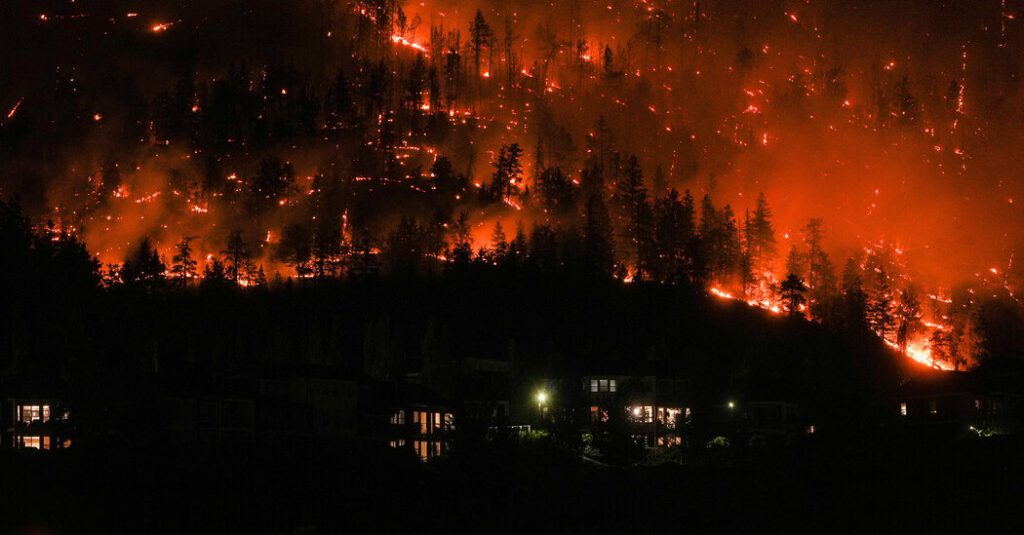The fire-ravaged Canadian province of British Columbia was under a state of emergency for the second day, as a wildfire in and around the resort city of Kelowna continued to consume houses.
Firefighters said on Saturday that a drop in wind was aiding their efforts to control the blaze but that the flames and embers continued to blow toward the city.
The fire is one of two in Canada that have led thousands to evacuate their homes in the last week. Hundreds of miles away from Kelowna, a wildfire converging on the city of Yellowknife, Northwest Territories, led officials to order a mass evacuation of the entire town.
Officials rated the risk of that wildfire to be extreme on Saturday and Sunday and high on Monday.
Rebecca Alty, the mayor of Yellowknife, a city of about 20,000, said an estimated 1,600 residents were defying evacuation orders and remained in the city.
“The fire is approaching,” she told the holdouts in an appeal aired by the Canadian Broadcasting Corporation. “We’re working hard to stop it, but let’s not get into a situation where we have to do an emergency evacuation.”
Firefighters battling the fire near Kelowna, which has a metropolitan population of about 200,000, said the fire danger had somewhat alleviated.
Jerrad Schroeder, deputy chief of the provincial wildfire service’s center for the region that includes Kelowna, said that overnight the fire had fallen to an intensity rating of two or three on a scale that runs up to six.
“It’s a good firefighting day,” he said.
“Last night we had a reprieve,” Jason Brolund, chief of the fire service in West Kelowna, the suburban community most ravaged by the flames, told reporters. Nevertheless, he said that 127 firefighters using 41 fire trucks were still dealing with multiple house fires on Saturday and that no end to the blaze was in sight.
“It’s become evident that this event is going to leave a long-lasting scar,” he said.
David Eby, the premier of British Columbia, said the province has used emergency powers to ban nonessential travel to the region around Kelowna, which is best known for its wineries and popular lakes, in a bid to free up hotel rooms and other accommodations for evacuees and emergency personnel including firefighters.
“We shouldn’t need an order, please stay out of these places,” he told reporters in Vancouver.
As of Saturday afternoon, about 30,000 people in the province were under evacuation orders and another 36,000 people were told to prepare to leave.
The airport at Kelowna remained closed for a second day to free airspace for water bombers as well as for police and wildfire fighting helicopters. The Royal Canadian Mounted Police said that drones have illegally flown into fire zones, sometimes forcing helicopters to withdraw, and that police boats have needed to chase sightseeing motorboats off portions of Okanagan Lake where water bombers are swooping in to refill.
Several fire officials said on Saturday that their forces were too busy to tally the number of homes destroyed in the Kelowna area, but they suggested that the number would be large.
“We will start counting the number of houses as soon as we stop fighting the fires,” Chief Brolund said.
In Yellowknife, Ms. Alty, the mayor, said that light rain had fallen on Friday night and smoke levels were not high enough to ground water bombers whose pilots were both attacking the fire and saturating the ground on the city’s edges.
“Some good suppression has happened,” she said.


